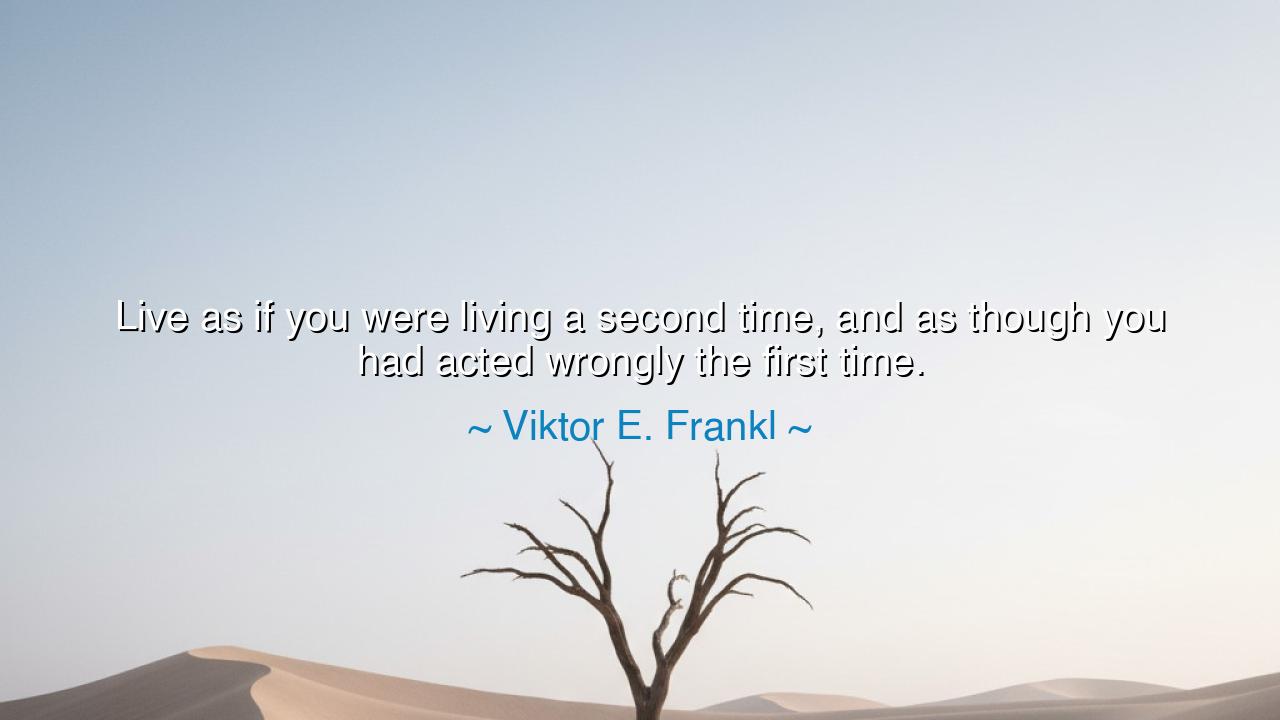
Live as if you were living a second time, and as though you had
Live as if you were living a second time, and as though you had acted wrongly the first time.






The words of Viktor E. Frankl—“Live as if you were living a second time, and as though you had acted wrongly the first time.”—resound with the gravity of one who had seen humanity at its lowest depths and still believed in its power to rise. Frankl, a survivor of the concentration camps, spoke not from theory but from fire. He knew that life is fragile, that choices matter, and that regret is the heaviest of chains. His quote calls us to live deliberately, as though life were a chance granted twice—and to act now in the light of the wisdom we too often only gain too late.
The ancients would have understood this. The Stoics urged men to practice premeditatio malorum—the meditation on misfortune—so that they might live wisely, free from later regret. Frankl’s words echo this discipline, but with a more urgent cry: imagine that you already failed, that you already squandered your chance, and that the gods, in their mercy, have given you one more turn. How carefully, how gratefully, how courageously would you live then! In this way, regret becomes a teacher, and life a sacred second chance.
History offers us radiant examples of this truth. Consider the life of Emperor Marcus Aurelius. Surrounded by war, betrayal, and plague, he wrote to himself in his Meditations: “Do not act as if you had ten thousand years to live.” He urged himself to seize each moment as though it were already lost once before. His reign, remembered as one of wisdom and justice, was born from this consciousness that life must be lived as if borrowed from eternity. Frankl’s words are an echo of this timeless resolve.
We also see this wisdom in the lives of the repentant. Think of John Newton, once a slave trader, who came to see the horror of his deeds. He lived his later years as if given a second chance, becoming a minister and penning Amazing Grace, a hymn of redemption sung across centuries. Had he lived only as before, his life would have ended in shame. But by embracing the vision of a second life, he transformed regret into legacy. Truly, he lived as one who had acted wrongly the first time, and sought to amend it.
Beloved listener, the meaning is clear: do not wait for regret to teach you after it is too late. Live now as though you were granted the mercy of reliving your days. Speak the words of kindness you once withheld. Take the risks you once avoided out of fear. Walk away from the wrongs you once excused. For the life you hold in your hands today is both your first and your second chance—there will be no other.
Practical wisdom demands this: each evening, reflect upon your day. Ask yourself: if I could live this day again, what would I do differently? Then rise with the dawn and do it differently. Make amends swiftly. Do not cling to grudges. Pursue your calling without delay. Let every choice be made with the solemn awareness that you do not walk this path twice. In this way, the imagined second life strengthens the first.
So let Frankl’s words burn within you: “Live as if you were living a second time, and as though you had acted wrongly the first time.” Do not drift through life as though time is infinite. Live with urgency, humility, and courage. For the greatest tragedy is not failure, but regret; and the greatest triumph is to live so fully, so deliberately, that when the end comes, you need not wish for a second chance. Instead, you may stand as Frankl himself stood: scarred, but unbroken, and able to say, I lived well.






AAdministratorAdministrator
Welcome, honored guests. Please leave a comment, we will respond soon